Live with it! Currently I am at 110% as Ethiopia, but I took twice as long to get it...<winces as his 31d aristocratic full land cavalry lose another battle>
Carthage Reborn - the first Tunisian AAR
- Thread starter Farquharson
- Start date
-
We have updated our Community Code of Conduct. Please read through the new rules for the forum that are an integral part of Paradox Interactive’s User Agreement.
You are using an out of date browser. It may not display this or other websites correctly.
You should upgrade or use an alternative browser.
You should upgrade or use an alternative browser.
Interesting, hmm.. Forging an alliance with the Ottomans again could work, or you could try befriending the Mameluks and plunging deeper into africa.
Plus you could always try and invade italy or something along those lines. Maybe save Granada.
Plus you could always try and invade italy or something along those lines. Maybe save Granada.
Hey, look at all these posts!  I'd better reply:
I'd better reply:

Yes, ladyfabia, who can tell the workings of a diseased mind like Muammar's...
Anibal - I promise you, Hannibal will be honoured, even if I die trying!
Stroph1, Lofman and calcsam2 - your comments regarding my outrageous inflation were very encouraging. They rekindled my hopes! I was especially glad to hear of someone with even higher inflation than me, calcsam2 - but don't worry - I'll catch you up!
Wasa, and others - thanks!
And finally, Machiavellian, the Ottoman alliance I like the sound of - I had the same idea myself
And if this AAR seems to you like a bit of a rollercoaster ride, hold on tight 'cos here comes...
Episode 7: The Bit where Everyone Sticks their Arms out and Shouts “Wheeeeee”!
Al-Hassan was a Sultan in the same mould as his father and his grandfather, that is, fairly useless. When his ally Sultan Ahmad of Fez declared war on Morocco in January 1526 a few days after Al-Hassan rose to the throne, Al-Hassan cancelled the Hafsid royal marriage with Morocco and joined in. He regarded this as a good opportunity to slim down the Hafsid Army, and thus save some money. The Tunisian Navy, newly acquired from Tripoli and consisting of one warship and one transport, was dispatched to the coast of Morocco with a contingent of 2000 men, who, as it turned out, were unable to land due to repeated sallies by the Moroccan Navy. The fleet finally turned for home but sank in its entirety somewhere off Tangiers. Thus did Al-Hassan successfully reduce his military budget. In March 1527 Sultan Ahmad made peace with Morocco.
Meanwhile Algiers had a new Sultan, Abdullah III, who was of a warlike disposition. Looking around for obvious enemies to attack, his gaze not unnaturally fell upon a certain neighbour who had so far conquered two of Algiers’ five provinces, and now had virtually no army to speak of. He declared war in August 1527.
Al-Hassan had fond hopes that, with the help of the Fezzis and a large bank loan he might be able to fight the Algerians off. He immediately sent the Hafsid Army to Aures and began raising reinforcements. The Hafsid Army arrived in the mountainous province just ahead of two Algerian armies, but was soon driven out again. They then tried to attack a small army defending the Algerian capital, but they were again defeated.
In March 1528 the aging Sultan Muammar emerged from his retirement home in Tripoli to lead another revolt. Two months later the Ottomans, now allies of the Algerians, landed a large army in Kabylia and laid siege to B-... that is, Annaba. Then in January 1529 Aures fell to the Algerians. Sultan Al-Hassan held a hasty consultation with his advisors:
Sultan Al-Hassan the Fairly Useless of the Much Imperilled Sultanate of Tunisia: Well guys, something tells me this one’s not quite going our way.
First advisor: Nonsense, Your Majesty, we’ve just had some poor luck to begin with. I say we send our 600 remaining cavalry against those 15000 spineless Ottomans and drive them into the sea!
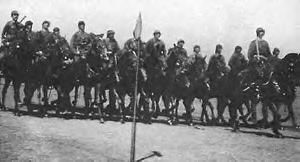
The might of the Hafsid Army
Al-Hassan: Er- yes... Well, thanks for that contribution. Anyone got any other ideas?
Second advisor: Sire! Let us revive the glory of the Hafsid Army. A few more bank loans will enable us to recruit a vast host that will easily defeat the Ottomans, the Algerians and even that geriatric Tripolitanian imbecile Sultan Muammar
Al-Hassan: Hmm, nice idea - I must say I was just longing for Tunisia to go bankrupt again. OK, who else?
Third advisor: Perhaps we could cede Aures to the Algerians, My Lord?
Al-Hassan: Never! That is where we are going to build our weapons manufactory! We will never give it up!
First advisor: Quite right Your Majesty! If we give in to international terrorism like this we will never be free of it! Send forth the glorious Hafsid Cavalry Squadron!
Second advisor: I agree, Your Excellency - except for the bit about the glorious Hafsid Cavalry Squadron. All we need is cash.
Al-Hassan: Cash, yes! That’s what we need! I have just had a brilliant idea of my own. Can someone lend me a coin?
Third advisor: Here you are, My Lord.
Al-Hassan takes the coin and examines it
Al-Hassan: OK, here’s my plan. Heads we give away Aures and end the war, tails we fight on. * He tosses the coin, catches it, and looks at it surreptitiously so no-one else can see * Ahem - heads it is! Well that settles that - the war’s over boys...
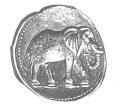
The actual coin used - now on display in the Bardo Museum, Tunis
And so, for the price of 3500 mountain dwelling berbers and a few iron mines, Tunisia bowed before the combined might of Algiers, the Ottoman Empire and ‘Sultan Muammar’. The Algerians and Turks went home, but ‘Sultan Muammar’ still had to be dealt with. By March 1532 the Hafsid Army’s 600 cavalry had been suitably reinforced and an attempt was made to drive the by now sizeable rebel army out of Tripolitania. Despite the fact that most of the rebels were killed, the attempt still ended in defeat. By August, however, the army’s morale had been restored and a second attack was successful. This time ‘Sultan Muammar’ was to be beheaded, but, rebel to the last, he died rather irritatingly the day before the ceremony.
In May 1532 Morocco had persuaded their allies Songhai to go to war with them against Fez. The Fezzis came to Al-Hassan asking for his aid. War-weary, and with the glimmer of a plan in his mind, Al-Hassan refused, cancelling the ties of friendship and the royal marriage that had bound Tunisia to Fez for over a hundred years. In August 1532 he sent an emissary to the Sublime Porte in Constantinople, offering to become an ally of the great and mighty Ottoman Empire, and the somewhat less great and mighty, but still quite scary, Sultanate of Algiers. The Turkish Sultan Suleyman I Kanuni accepted.
This brought Tunisia into a number of interesting wars, which all had the great merit of being fought far away from Tunisia, by their powerful allies, against weak and ill-equipped enemies. One such war was already going on against Moldavia in 1532. Al-Hassan was still trying desperately to scrape together enough money to repay his loan, which was due in August 1537. In November 1536 Moldavia made peace with Sultan Suleyman, handing over Bujak and a large wagonload of gold. Suleyman magnanimously sent a portion of the booty to his loyal ally Al-Hassan, and a few months later the loan was paid off at last.

Ibn Gaddafi - just like his father in every way
Meanwhile, in 1534 ‘Sultan Muammar’s son, styling himself ‘Ibn Gaddafi’ had led yet another revolt in Tripoli, and the Hafsid Army, currently posted there, were driven out. It was not until 1540 that the army could be reinforced sufficiently to counter-attack, but the job was well done and Ibn Gaddafi fled. At last the Sultanate appeared to be secure and at peace. What’s more, Tunisia were now in an alliance with their western neighbour, and once again with the mighty Ottomans, rekindling the hope that they might be able to extend the realm eastwards by taking some provinces from the nasty Mameluks. Yes, thought Al-Hassan, as he neared the end of his days, the dream of Carthage Reborn has not yet died... And with that he ended his days, in January 1542.
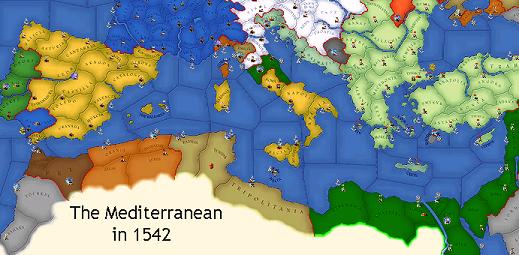
OK, so it’s a little like the map from 1452, but that’s not the point. The point is, we’re having a blast, right?
Nice idea jwolf, but I can't bring myself to abandon my beloved Tunisia even for temporarily!The best way I can think to bring down the inflation would be to play another country for a while and let the AI cheat the inflation down for you. I've never tried that, but that's all I can think of. Otherwise, you need not just an exceptional year, but an exceptional 20 or 30.
Yes, ladyfabia, who can tell the workings of a diseased mind like Muammar's...
Anibal - I promise you, Hannibal will be honoured, even if I die trying!
Stroph1, Lofman and calcsam2 - your comments regarding my outrageous inflation were very encouraging. They rekindled my hopes! I was especially glad to hear of someone with even higher inflation than me, calcsam2 - but don't worry - I'll catch you up!
Wasa, and others - thanks!
And finally, Machiavellian, the Ottoman alliance I like the sound of - I had the same idea myself
And if this AAR seems to you like a bit of a rollercoaster ride, hold on tight 'cos here comes...
Episode 7: The Bit where Everyone Sticks their Arms out and Shouts “Wheeeeee”!
Al-Hassan was a Sultan in the same mould as his father and his grandfather, that is, fairly useless. When his ally Sultan Ahmad of Fez declared war on Morocco in January 1526 a few days after Al-Hassan rose to the throne, Al-Hassan cancelled the Hafsid royal marriage with Morocco and joined in. He regarded this as a good opportunity to slim down the Hafsid Army, and thus save some money. The Tunisian Navy, newly acquired from Tripoli and consisting of one warship and one transport, was dispatched to the coast of Morocco with a contingent of 2000 men, who, as it turned out, were unable to land due to repeated sallies by the Moroccan Navy. The fleet finally turned for home but sank in its entirety somewhere off Tangiers. Thus did Al-Hassan successfully reduce his military budget. In March 1527 Sultan Ahmad made peace with Morocco.
Meanwhile Algiers had a new Sultan, Abdullah III, who was of a warlike disposition. Looking around for obvious enemies to attack, his gaze not unnaturally fell upon a certain neighbour who had so far conquered two of Algiers’ five provinces, and now had virtually no army to speak of. He declared war in August 1527.
Al-Hassan had fond hopes that, with the help of the Fezzis and a large bank loan he might be able to fight the Algerians off. He immediately sent the Hafsid Army to Aures and began raising reinforcements. The Hafsid Army arrived in the mountainous province just ahead of two Algerian armies, but was soon driven out again. They then tried to attack a small army defending the Algerian capital, but they were again defeated.
In March 1528 the aging Sultan Muammar emerged from his retirement home in Tripoli to lead another revolt. Two months later the Ottomans, now allies of the Algerians, landed a large army in Kabylia and laid siege to B-... that is, Annaba. Then in January 1529 Aures fell to the Algerians. Sultan Al-Hassan held a hasty consultation with his advisors:
Sultan Al-Hassan the Fairly Useless of the Much Imperilled Sultanate of Tunisia: Well guys, something tells me this one’s not quite going our way.
First advisor: Nonsense, Your Majesty, we’ve just had some poor luck to begin with. I say we send our 600 remaining cavalry against those 15000 spineless Ottomans and drive them into the sea!
The might of the Hafsid Army
Al-Hassan: Er- yes... Well, thanks for that contribution. Anyone got any other ideas?
Second advisor: Sire! Let us revive the glory of the Hafsid Army. A few more bank loans will enable us to recruit a vast host that will easily defeat the Ottomans, the Algerians and even that geriatric Tripolitanian imbecile Sultan Muammar
Al-Hassan: Hmm, nice idea - I must say I was just longing for Tunisia to go bankrupt again. OK, who else?
Third advisor: Perhaps we could cede Aures to the Algerians, My Lord?
Al-Hassan: Never! That is where we are going to build our weapons manufactory! We will never give it up!
First advisor: Quite right Your Majesty! If we give in to international terrorism like this we will never be free of it! Send forth the glorious Hafsid Cavalry Squadron!
Second advisor: I agree, Your Excellency - except for the bit about the glorious Hafsid Cavalry Squadron. All we need is cash.
Al-Hassan: Cash, yes! That’s what we need! I have just had a brilliant idea of my own. Can someone lend me a coin?
Third advisor: Here you are, My Lord.
Al-Hassan takes the coin and examines it
Al-Hassan: OK, here’s my plan. Heads we give away Aures and end the war, tails we fight on. * He tosses the coin, catches it, and looks at it surreptitiously so no-one else can see * Ahem - heads it is! Well that settles that - the war’s over boys...
The actual coin used - now on display in the Bardo Museum, Tunis
And so, for the price of 3500 mountain dwelling berbers and a few iron mines, Tunisia bowed before the combined might of Algiers, the Ottoman Empire and ‘Sultan Muammar’. The Algerians and Turks went home, but ‘Sultan Muammar’ still had to be dealt with. By March 1532 the Hafsid Army’s 600 cavalry had been suitably reinforced and an attempt was made to drive the by now sizeable rebel army out of Tripolitania. Despite the fact that most of the rebels were killed, the attempt still ended in defeat. By August, however, the army’s morale had been restored and a second attack was successful. This time ‘Sultan Muammar’ was to be beheaded, but, rebel to the last, he died rather irritatingly the day before the ceremony.
In May 1532 Morocco had persuaded their allies Songhai to go to war with them against Fez. The Fezzis came to Al-Hassan asking for his aid. War-weary, and with the glimmer of a plan in his mind, Al-Hassan refused, cancelling the ties of friendship and the royal marriage that had bound Tunisia to Fez for over a hundred years. In August 1532 he sent an emissary to the Sublime Porte in Constantinople, offering to become an ally of the great and mighty Ottoman Empire, and the somewhat less great and mighty, but still quite scary, Sultanate of Algiers. The Turkish Sultan Suleyman I Kanuni accepted.
This brought Tunisia into a number of interesting wars, which all had the great merit of being fought far away from Tunisia, by their powerful allies, against weak and ill-equipped enemies. One such war was already going on against Moldavia in 1532. Al-Hassan was still trying desperately to scrape together enough money to repay his loan, which was due in August 1537. In November 1536 Moldavia made peace with Sultan Suleyman, handing over Bujak and a large wagonload of gold. Suleyman magnanimously sent a portion of the booty to his loyal ally Al-Hassan, and a few months later the loan was paid off at last.
Ibn Gaddafi - just like his father in every way
Meanwhile, in 1534 ‘Sultan Muammar’s son, styling himself ‘Ibn Gaddafi’ had led yet another revolt in Tripoli, and the Hafsid Army, currently posted there, were driven out. It was not until 1540 that the army could be reinforced sufficiently to counter-attack, but the job was well done and Ibn Gaddafi fled. At last the Sultanate appeared to be secure and at peace. What’s more, Tunisia were now in an alliance with their western neighbour, and once again with the mighty Ottomans, rekindling the hope that they might be able to extend the realm eastwards by taking some provinces from the nasty Mameluks. Yes, thought Al-Hassan, as he neared the end of his days, the dream of Carthage Reborn has not yet died... And with that he ended his days, in January 1542.
OK, so it’s a little like the map from 1452, but that’s not the point. The point is, we’re having a blast, right?
Last edited:
OK, so it’s a little like the map from 1452, but that’s not the point. The point is, we’re having a blast, right?
Yes, Yes, Yes!
Love the updates!
Sometimes it takes all the running you can do just to stay in one place!
Or as a wise man once said, 'The key to playing a minor is to be part of a strong alliance.' (Thanks, Storey!)
I'm enjoying your tale but shuddering over your inflation. Good luck!
Or as a wise man once said, 'The key to playing a minor is to be part of a strong alliance.' (Thanks, Storey!)
I'm enjoying your tale but shuddering over your inflation. Good luck!
So the vicious Algerians took back Aures. Well not so good things happen, and I'm confident in your abilities to bring glory to the mighty Tunisian Empire!
Conquer Sicily from the Spanish! They have to be weak as they've lost Andalusia to the French sometime between 1494 and 1526 judging from the maps.
Conquer Sicily from the Spanish! They have to be weak as they've lost Andalusia to the French sometime between 1494 and 1526 judging from the maps.
Thank you one and all for your encouraging comments!


But check this out folks...
Episode 8: Doing Nothing by Hafs
For a Hafsid, Sultan Ahmad III, the son of Al-Hassan, was a cut above the average. For one thing, he believed in personally leading his troops in battle. Almost as soon as he came to power, Ibn Gaddafi had the cheek to try another revolt, which was immediately crushed by Ahmad.
There then followed a long period of peace and what passed for prosperity in the inflation-ridden Sultanate of Tunisia. Of course, there were occasional distant wars fought by the Ottoman Turks, in which Ahmad nominally participated, but none of them affected Tunisia either positively or negatively. As time wore on Ahmad began to dream of colonizing new lands, if only he could find some. Several expensive gifts were sent to the Songhai Emperor Daoud, who finally agreed to share some maps of the interior of West Africa with Ahmad, but these did not reveal any uninhabited regions.
Finally, in 1566, Ahmad decided that it was time to show his military prowess by going to war. The nasty Mameluks had just ended a war with Persia, and the Ottomans had just finished annexing Bosnia, so Ahmad expanded the Hafsid Army a little and declared war on the Mameluks, and their allies the Hedjaz. The Turkish Sultan Suleyman gladly joined the war, however Algiers dropped out of the alliance. Before setting out, Ahmad made a stirring speech to his troops:

Sultan Ahmad addresses his troops
Sultan Ahmad III of the small but possibly expandable Sultanate of Tunisia: Soldiers of the glorious and utterly invincible Hafsid Army, I salute you!
The Hafsid Army, as one man: Hurrah!
Ahmad: We are marching to war against our ancient enemies, the nasty Mameluks of the east. We will make their blood flow in torrents!
The Hafsid Army, as one man: Yes! Yes!
Ahmad: Some of you may never return.
The Hafsid Army, as one man: We don’t mind!
Ahmad: In fact, it is possible that none of you will return.
The Hafsid Army, as one man: Oh.
Ahmad: I do not hide from you the fact that this is indeed a perilous undertaking. None of my forefathers ever succeeded in conquering a single Mameluk province. Some may say I am foolhardy in this venture. Soldiers of the Hafsid Army, do you still wish to follow me into battle?
The Hafsid Army, as one man: Not really, no.
Ahmad: Well, this the army, and unfortunately you don’t have any say in the matter. Now - let’s get going.
The Hafsid Army, with Ahmad at its head, marched across the now familiar desert sands to Benghazi, encountering no Mameluk opposition, and besieged the city, which fell in July 1567. Shortly before this the Ottoman Empire made peace with the Mameluks, and dropped out of the war.
By September Ahmad had reached El Alamein and was laying siege to that city, which fell in March 1568. The Hafsid Army had still not spotted a single Mameluk army - Ahmad could hardly believe his luck! Nevertheless the Mameluks refused to hand over Cyrenaica. 1568 was an exceptional year for the Tunisian economy, so Ahmad was able to reinforce his now cautiously jubilant army and lead them on to Alexandria.
He reached the city in September and began a siege. The following March a Mameluk army finally arrived, but Ahmad now proved his military genius by inflicting a brilliant defeat on the Mameluks. In July 1569 a second Mameluk attack was defeated, and Alexandria fell the very next day. The Mameluks, realizing that they had met their match in this unprecedentedly capable Tunisian leader, immediately offered to hand over Cyrenaica, Quattara and Alexandria to Sultan Ahmad.
Sultan Ahmad read through the peace treaty proposed by the Mameluk emissary and gawped. He pinched himself. Then he went and banged his head several times against a nearby pillar. He staggered. He lurched. He reeled. Finally a quick-witted advisor suggested that perhaps he should sign the treaty, and a court attendant helped him to hold the pen while he did so. In one fell swoop Ahmad had doubled the size of Tunisia to include not just a couple of rather impoverished desert provinces, but also the great trading centre of Alexandria.
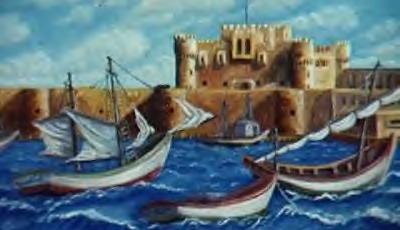
A view of Alexandria, from the 1568 Berlitz Guidebook
Needless to say, the people of these three provinces were not exactly overjoyed to suddenly find themselves part of the Sultanate of Tunisia. The people of Cyrenaica and Quattara in particular, who had by now become nasty Shi’ites, were especially unhappy. The Cyrenaicans had in fact already revolted even before the end of the war. Ahmad was just on his way to quell this revolt with half of his army, when unfortunately he died - after all, he was knocking on a bit, and all that riding back and forth across the desert sands is bound to take its toll eventually.
Ahmad was succeeded by his middle-aged son Muhammad VI. The first thing that happened in his reign was that the people of Alexandria revolted, and the other half of the army that had stayed behind was driven out of the province. Meanwhile the Cyrenaican rebels had captured Benghazi and moved on to Tripoli and the half of the army which were meant to be dealing with them were instead completely annihilated. It was clearly back to business as usual for the Hafsid Army.
Sultan Muhammad VI only reigned for five years, and they were extremely troubled years. Reluctantly he took a bank loan in 1570 in order to finance the rebuilding of sufficient armies to deal with the frequent rebellions in his eastern provinces. Finally, by the time of his death in 1574, all the rebel movements had been crushed, at least for the moment, however there was still the question of a hefty bank loan to be repaid. This problem he left to his son, Sinan.
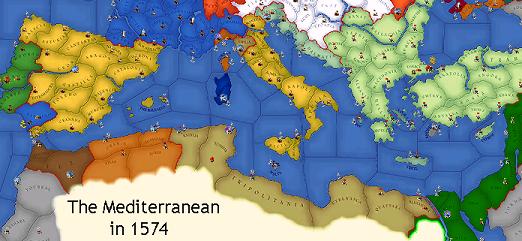
Hah! Inflation! I don't even bother to look at it any moreI'm enjoying your tale but shuddering over your inflation. Good luck!
Well, Lofman, I'll keep that in mind as a suicidal last resort!Conquer Sicily from the Spanish!
But check this out folks...
Episode 8: Doing Nothing by Hafs
For a Hafsid, Sultan Ahmad III, the son of Al-Hassan, was a cut above the average. For one thing, he believed in personally leading his troops in battle. Almost as soon as he came to power, Ibn Gaddafi had the cheek to try another revolt, which was immediately crushed by Ahmad.
There then followed a long period of peace and what passed for prosperity in the inflation-ridden Sultanate of Tunisia. Of course, there were occasional distant wars fought by the Ottoman Turks, in which Ahmad nominally participated, but none of them affected Tunisia either positively or negatively. As time wore on Ahmad began to dream of colonizing new lands, if only he could find some. Several expensive gifts were sent to the Songhai Emperor Daoud, who finally agreed to share some maps of the interior of West Africa with Ahmad, but these did not reveal any uninhabited regions.
Finally, in 1566, Ahmad decided that it was time to show his military prowess by going to war. The nasty Mameluks had just ended a war with Persia, and the Ottomans had just finished annexing Bosnia, so Ahmad expanded the Hafsid Army a little and declared war on the Mameluks, and their allies the Hedjaz. The Turkish Sultan Suleyman gladly joined the war, however Algiers dropped out of the alliance. Before setting out, Ahmad made a stirring speech to his troops:
Sultan Ahmad addresses his troops
Sultan Ahmad III of the small but possibly expandable Sultanate of Tunisia: Soldiers of the glorious and utterly invincible Hafsid Army, I salute you!
The Hafsid Army, as one man: Hurrah!
Ahmad: We are marching to war against our ancient enemies, the nasty Mameluks of the east. We will make their blood flow in torrents!
The Hafsid Army, as one man: Yes! Yes!
Ahmad: Some of you may never return.
The Hafsid Army, as one man: We don’t mind!
Ahmad: In fact, it is possible that none of you will return.
The Hafsid Army, as one man: Oh.
Ahmad: I do not hide from you the fact that this is indeed a perilous undertaking. None of my forefathers ever succeeded in conquering a single Mameluk province. Some may say I am foolhardy in this venture. Soldiers of the Hafsid Army, do you still wish to follow me into battle?
The Hafsid Army, as one man: Not really, no.
Ahmad: Well, this the army, and unfortunately you don’t have any say in the matter. Now - let’s get going.
The Hafsid Army, with Ahmad at its head, marched across the now familiar desert sands to Benghazi, encountering no Mameluk opposition, and besieged the city, which fell in July 1567. Shortly before this the Ottoman Empire made peace with the Mameluks, and dropped out of the war.
By September Ahmad had reached El Alamein and was laying siege to that city, which fell in March 1568. The Hafsid Army had still not spotted a single Mameluk army - Ahmad could hardly believe his luck! Nevertheless the Mameluks refused to hand over Cyrenaica. 1568 was an exceptional year for the Tunisian economy, so Ahmad was able to reinforce his now cautiously jubilant army and lead them on to Alexandria.
He reached the city in September and began a siege. The following March a Mameluk army finally arrived, but Ahmad now proved his military genius by inflicting a brilliant defeat on the Mameluks. In July 1569 a second Mameluk attack was defeated, and Alexandria fell the very next day. The Mameluks, realizing that they had met their match in this unprecedentedly capable Tunisian leader, immediately offered to hand over Cyrenaica, Quattara and Alexandria to Sultan Ahmad.
Sultan Ahmad read through the peace treaty proposed by the Mameluk emissary and gawped. He pinched himself. Then he went and banged his head several times against a nearby pillar. He staggered. He lurched. He reeled. Finally a quick-witted advisor suggested that perhaps he should sign the treaty, and a court attendant helped him to hold the pen while he did so. In one fell swoop Ahmad had doubled the size of Tunisia to include not just a couple of rather impoverished desert provinces, but also the great trading centre of Alexandria.
A view of Alexandria, from the 1568 Berlitz Guidebook
Needless to say, the people of these three provinces were not exactly overjoyed to suddenly find themselves part of the Sultanate of Tunisia. The people of Cyrenaica and Quattara in particular, who had by now become nasty Shi’ites, were especially unhappy. The Cyrenaicans had in fact already revolted even before the end of the war. Ahmad was just on his way to quell this revolt with half of his army, when unfortunately he died - after all, he was knocking on a bit, and all that riding back and forth across the desert sands is bound to take its toll eventually.
Ahmad was succeeded by his middle-aged son Muhammad VI. The first thing that happened in his reign was that the people of Alexandria revolted, and the other half of the army that had stayed behind was driven out of the province. Meanwhile the Cyrenaican rebels had captured Benghazi and moved on to Tripoli and the half of the army which were meant to be dealing with them were instead completely annihilated. It was clearly back to business as usual for the Hafsid Army.
Sultan Muhammad VI only reigned for five years, and they were extremely troubled years. Reluctantly he took a bank loan in 1570 in order to finance the rebuilding of sufficient armies to deal with the frequent rebellions in his eastern provinces. Finally, by the time of his death in 1574, all the rebel movements had been crushed, at least for the moment, however there was still the question of a hefty bank loan to be repaid. This problem he left to his son, Sinan.
Last edited:
The spanish don't look particularly weak to me, it seems like they have went on to conquer almost all of Italy. Excellent Job taking Alexandria, now you merely need to hold onto it and not let pesky rebels cause you more problems.
Good luck when you face the western powers 
Is that a French province right at the tip of the Iberian peninsula?
Is that a French province right at the tip of the Iberian peninsula?
Regarding the western powers, "good luck when you face them" probably sums up the situation best! Sorry, LordLeto, but I don't fancy storming the mountainous island of Sardinia with the paltry army that I could put afloat at present! The Spanish are indeed not that weak Machiavellian, although, yes TreizeV, that is a French Andalusia you see, which the Spanish seem to be turning a blind eye to for the moment.
Basically my tech is miles behind - Sardinia are at 17 land, as are the Knights, who own Malta, although it's been overrun by rebels for about a century. Spain are at 16, the Ottomans are at 11, and Yours Truly... a magnificent 3! And the cost of replenishing my army with inflation at nearly 130% means wars have to be extremely one-sided or it's not worth getting into them.
And the cost of replenishing my army with inflation at nearly 130% means wars have to be extremely one-sided or it's not worth getting into them.
Still, I've now played to 1591 (update tomorrow) and I'm still holding out. And more importantly, still enjoying it!
Basically my tech is miles behind - Sardinia are at 17 land, as are the Knights, who own Malta, although it's been overrun by rebels for about a century. Spain are at 16, the Ottomans are at 11, and Yours Truly... a magnificent 3!
Still, I've now played to 1591 (update tomorrow) and I'm still holding out. And more importantly, still enjoying it!
With extremely high inflation, there are two things you MUST do (from experience as Ethiopia): Russian DP settings (ie, full sefdom, full land, full aristocracy) and get land 5 and 9 quickly. At 110% inflation as Ethiopia, I have 11d infantry and 31d cavalry. Not bad. The part where all my neighbors are a CRT ahead of me, though....
Congratulations on playing on, and on mounting such a comeback!
Today Alexandria (income!), tomorrow ... a bit more of Africa!
Death to the Mamelukes, the rebels and the wearers of silly hats!
(OK, if you do take North Africa, you'll then have a choice of the big green blob, the big blue blob or the big yellow blob(s), but I have faith in you!)
On a semi-serious note, taking Malta from the rebels should be do-able - and what's everyone else's inflation?
Today Alexandria (income!), tomorrow ... a bit more of Africa!
Death to the Mamelukes, the rebels and the wearers of silly hats!
(OK, if you do take North Africa, you'll then have a choice of the big green blob, the big blue blob or the big yellow blob(s), but I have faith in you!)
On a semi-serious note, taking Malta from the rebels should be do-able - and what's everyone else's inflation?
Thanks for the helpful hints, calcsam2  - I will get working on these things ASAP!
- I will get working on these things ASAP!
I've been toying with the idea of grabbing Malta, merrick. Last time I looked they were allied with Spain, though, and the Spanish might consider me an easy target...
Episode 9: Shi’ites, Nice and Nasty
Sultan Sinan reigned for only two years, however in this short period he did do one thing of significance. He officially outlawed the phrase “nasty Shi’ite”, declaring that there was nothing in fact inherently nasty about being a Shi’ite, and that, in fact, some of his best friends were Shi’ites. This probably contributed to his death, which was caused mainly by having a dagger stuck between his shoulderblades in a dark alley one night, but it also greatly improved the mood of the people of Cyrenaica and Quattara, who hailed him as “a jolly good fellow”.
Sinan’s brother, Kilik Ali now rose to the throne in Tunis. The next few years were spent consolidating the Hafsid Army, which was now divided in two parts, the Western and the Eastern, and repaying the country’s debts. Being allied with the Ottoman Empire meant that Sultan Kilik Ali was involved in wars with Persia, Moldavia, Georgia, Venice and Russia. This was all fairly theoretical, apart from a stray contingent of Venetians who landed in Alexandria one day and were immediately annihilated by the Eastern Hafsid Army.
Then in October 1584 the Ottoman Sultan Murad III declared war on the nasty Mameluks. It should be noted that the phrase “nasty Mameluk” was still allowed, and indeed encouraged, in Tunisia, seeing as it was considered that being a Mameluk was inherently nasty, and not just on account of being Shi’ite, of course. There was much confusion about terms that were officially allowed when discussing the war, and strange conversations were often overheard in the tea-shops of Tunis:
First tea-drinker: Well, it sounds like good news to me - war with those nasty Shi’ites again!
Second tea-drinker: Ooooh! You said it! You said ‘nasty Shi’ites’!
First tea-drinker: Oops! Did I? Well, of course I meant to say, ‘nasty Mameluk Shi’ites’.
Second tea-drinker: No, no, ‘nasty Mameluk Shi’ites’ isn’t allowed - you have to say ‘nasty Shi’ite Mameluks’.
First tea-drinker: Are you sure? Isn’t it ‘Shi’ite nasty Mameluks’?
Second tea-drinker: No, I don’t think so. But you can say ‘Shi’ite Mameluk nasties’ if you want.
First tea-drinker: But not ‘Mameluk Shi’ite nasties’, right?
Second tea-drinker: Right.
A large and menacing-looking stranger, coming over from the other side of the tea-room: Excuse me, but I couldn’t help overhearing you - you haven’t got anything against Shi’ites have you? Only - I’m a Shi’ite, see?
Second tea-drinker: Shi’ites? Oooh no! Shi’ites are reeely nice people! Er - are you a Mameluk, by any chance?
* PAAAF! The tea-drinker lands in a heap in the corner *
Stranger: Call me a Mameluk, would you?
Anyway, Kilik Ali joined Murad in his war, and the Eastern Army was immediately ordered into Delta Province, where they laid siege to the city of Damietta in December. The Western Army was meanwhile left to guard against revolts, which were still a high risk in the eastern provinces.
As in the previous war, the Mameluk territories seemed to be pleasantly devoid of Mameluk armies, and the Eastern Hafsid Army was left more or less in peace over the next few years to capture province after province from the Mameluks. By 1589 Tunisia controlled the provinces of Delta, Egypt, Cataract and Nile and were besieging Sinai, when they were attacked by a large Hedjaz army and completely annihilated. The Mameluks had meanwhile stubbornly refused all peace offers. With anti-war revolts beginning to threaten the realm and the eastern frontier now defenceless, the new Sultan, Ibrahim who had succeeded Kilik Ali in 1587, quickly offered the most generous peace deal yet, demanding only Cataract Province, and the Mameluks finally accepted. This outcome was somewhat disappointing, especially since the inhabitants of Cataract were Shi’ites, though not of course nasty ones, but at least the war had been won without incurring any debts and with only minimal revolt problems.
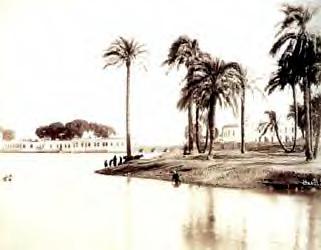
The Nile at Asyut, capital of Cataract Province. The people in the picture are some nice Shi’ites.
During this time the Western Army had been marching the entire length of the Tunisian Sultanate, which took them nearly six months, in order to deal with a Berber revolt in Kabylia. This was quelled in January 1590. Meanwhile a new Eastern Army was quickly raised in Alexandria, and in January 1591 Kilik Ali was succeeded by Sultan Uthman.
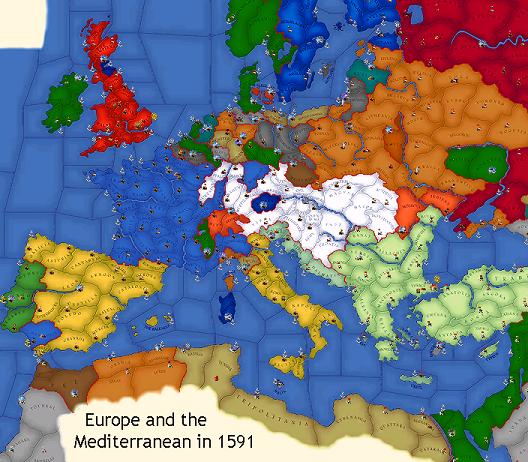
Showing a little more this time, as I know how people like to see what’s going on elsewhere! Eeek - where’s Scotland gone?
I've been toying with the idea of grabbing Malta, merrick. Last time I looked they were allied with Spain, though, and the Spanish might consider me an easy target...
Episode 9: Shi’ites, Nice and Nasty
Sultan Sinan reigned for only two years, however in this short period he did do one thing of significance. He officially outlawed the phrase “nasty Shi’ite”, declaring that there was nothing in fact inherently nasty about being a Shi’ite, and that, in fact, some of his best friends were Shi’ites. This probably contributed to his death, which was caused mainly by having a dagger stuck between his shoulderblades in a dark alley one night, but it also greatly improved the mood of the people of Cyrenaica and Quattara, who hailed him as “a jolly good fellow”.
Sinan’s brother, Kilik Ali now rose to the throne in Tunis. The next few years were spent consolidating the Hafsid Army, which was now divided in two parts, the Western and the Eastern, and repaying the country’s debts. Being allied with the Ottoman Empire meant that Sultan Kilik Ali was involved in wars with Persia, Moldavia, Georgia, Venice and Russia. This was all fairly theoretical, apart from a stray contingent of Venetians who landed in Alexandria one day and were immediately annihilated by the Eastern Hafsid Army.
Then in October 1584 the Ottoman Sultan Murad III declared war on the nasty Mameluks. It should be noted that the phrase “nasty Mameluk” was still allowed, and indeed encouraged, in Tunisia, seeing as it was considered that being a Mameluk was inherently nasty, and not just on account of being Shi’ite, of course. There was much confusion about terms that were officially allowed when discussing the war, and strange conversations were often overheard in the tea-shops of Tunis:
First tea-drinker: Well, it sounds like good news to me - war with those nasty Shi’ites again!
Second tea-drinker: Ooooh! You said it! You said ‘nasty Shi’ites’!
First tea-drinker: Oops! Did I? Well, of course I meant to say, ‘nasty Mameluk Shi’ites’.
Second tea-drinker: No, no, ‘nasty Mameluk Shi’ites’ isn’t allowed - you have to say ‘nasty Shi’ite Mameluks’.
First tea-drinker: Are you sure? Isn’t it ‘Shi’ite nasty Mameluks’?
Second tea-drinker: No, I don’t think so. But you can say ‘Shi’ite Mameluk nasties’ if you want.
First tea-drinker: But not ‘Mameluk Shi’ite nasties’, right?
Second tea-drinker: Right.
A large and menacing-looking stranger, coming over from the other side of the tea-room: Excuse me, but I couldn’t help overhearing you - you haven’t got anything against Shi’ites have you? Only - I’m a Shi’ite, see?
Second tea-drinker: Shi’ites? Oooh no! Shi’ites are reeely nice people! Er - are you a Mameluk, by any chance?
* PAAAF! The tea-drinker lands in a heap in the corner *
Stranger: Call me a Mameluk, would you?
Anyway, Kilik Ali joined Murad in his war, and the Eastern Army was immediately ordered into Delta Province, where they laid siege to the city of Damietta in December. The Western Army was meanwhile left to guard against revolts, which were still a high risk in the eastern provinces.
As in the previous war, the Mameluk territories seemed to be pleasantly devoid of Mameluk armies, and the Eastern Hafsid Army was left more or less in peace over the next few years to capture province after province from the Mameluks. By 1589 Tunisia controlled the provinces of Delta, Egypt, Cataract and Nile and were besieging Sinai, when they were attacked by a large Hedjaz army and completely annihilated. The Mameluks had meanwhile stubbornly refused all peace offers. With anti-war revolts beginning to threaten the realm and the eastern frontier now defenceless, the new Sultan, Ibrahim who had succeeded Kilik Ali in 1587, quickly offered the most generous peace deal yet, demanding only Cataract Province, and the Mameluks finally accepted. This outcome was somewhat disappointing, especially since the inhabitants of Cataract were Shi’ites, though not of course nasty ones, but at least the war had been won without incurring any debts and with only minimal revolt problems.
The Nile at Asyut, capital of Cataract Province. The people in the picture are some nice Shi’ites.
During this time the Western Army had been marching the entire length of the Tunisian Sultanate, which took them nearly six months, in order to deal with a Berber revolt in Kabylia. This was quelled in January 1590. Meanwhile a new Eastern Army was quickly raised in Alexandria, and in January 1591 Kilik Ali was succeeded by Sultan Uthman.
Showing a little more this time, as I know how people like to see what’s going on elsewhere! Eeek - where’s Scotland gone?
Last edited:
Tunisa is starting to look the part of a great Northern African nation, now all you need is a few good deflation events.
I just uncovered your little gem of a story today and I'm glad I did! My hats off to you. I've tried Tunisia before and ended up throwing in the towel. Keep up the good work and I'd like to add, go for the Arabian Peninsula. Beat the crap out of those Omanis.

